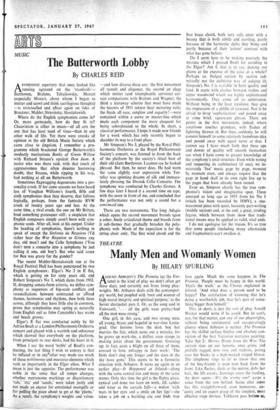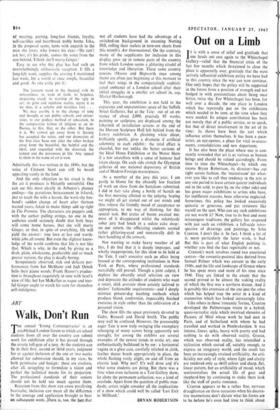Manly Men and Womanly Women THEATRE
By HILARY SPURLING
ALEKSEI ARBUZOV'S The Promise (at the For- tune) is the kind of play we don't often get these days, and certainly not from living play- wrights. Mr. Arbuzov deals with the contempor- ary world, but peopled with 'men and women of high moral integrity and spiritual purpose,' as the Soviet dustjacket puts it. Or, as the song said in Valmouth, `. . . all the girls were pretty/And all the men were strong.'
One girl, in this case, and two strong men, all young, brave and hopeful in war-time Lenin- grad. Our heroine loves the dark boy but marries the fair, which turns out a mistake, for he grows up work-shy, a drifter, even stoops to making jokes about the government. Growing up, in fact, casts a blight on all three of them, crossed in love, unhappy in their work : 'The birds don't sing any longer and the stars in the sky have gone.' This seems to be a favourite situation with Arbuzov. It turns up again in an earlier play—lt Happened at Irkutsk—along with the same central trio and many of the same scenes. Only this time the girl is the flighty piece, cynical and none too keen on work, till, sadder and wiser as the curtain falls—a widow 'with tears in her eyes and a smile on her lips'—she takes a job on a building site and finds true
love again. Much the same happens in The Promise. 'People must be happy in this world. That's the truth,' as the Chorus explained in Irkutsk. 'And what does a person need to be happy? The satisfaction of knowing that he's doing a worthwhile job, that he's part of some- thing bigger than himself.'
This, in short, is just the sort of play Arnold Wesker would write if he could. But he can't, nor, for that matter, can any of our playwrights, without being sentimental and exasperatingly clumsy where Arbuzov is neither. The Promise has the skilful surface fidelity and absolute con- viction of the best Victorian narrative painting. Take Act 2: Heroes Home from the War. The curtain rises on our heroine, once grimy and pitifully ragged, now rosy and studious, poring over her books in a high-necked striped blouse. The telephone rings to let us know that one of the boy-friends is even now back from the front. Lika flushes, darts at the mirror, dabs her hair, the lift creaks, footsteps cross the landing, the door opens—it's the wrong one!' gasps a voice from the row behind. Scene after scene has this straightforward, even humorous, sin- . cerity and an expert grasp of the simplest, most effective stage devices. Tableaux pass befou us,
of meeting, parting, long-lost friends, loyalty, self-sacrifice and heartbreak nobly borne. Lika, in the proposal scene, turns with anguish to the man she loves, who lowers his eyes—'He can't ask her, it's his pride,' comes the voice from the row behind, 'I think shell marry Ginger.'
Easy to see why this play has had such an overwhelmingly enthusiastic reception. It fills a long-felt want, supplies the craving I mentioned last week, for a world at once simple, beautiful and good. As one critic put it :
The [current trend in the theatre] with its unloveliness, its want of faith, its hopeless, despairing creed; its worship of the ugly in art; its grim and repulsive reality, regret it as we may, is a solemn and resistless fact. . . .
We may ascribe it to the change of tone and thought at our public schools and univer- sities, to our godless method of education, to the comparative failure of religion as an in- fluence, to this, that, or the other. But there it is. We cannot get away from it. Society has accepted the satire, and our dramatists of the first class have one after the other broken away from the beautiful, the helpful and the ideal, and coquetted with the distorted, the tainted and the poisonous in life. Any appeal to them in the name of art is vain.
Admittedly this was written in the 1890s, but the voice of Clement Scott can still be heard appealing vainly in the land.
And the only objection to his creed is that the art it produces is blatantly untruthful. One can see this most clearly in Arbuzov's phoney endings—the gratuitous bereavement in Irkutsk, just to teach the wife a lesson, the work-shy hus- band's sudden change of heart after thirteen wasted years, faked to make things add up right in The Promise. The characters are. puppets and, with the author pulling strings, no one in the audience could seriously doubt that both boys will come home heroes, that she will marry Ginger, or that, in spite of everything, life will yield the answer: true love at last and worth- while jobs all round. But even the slightest know- ledge of the world confirms that life is not like that. Which is why, in the end, by giving us a drab, plain, wholesome, predictable and so much poorer version, the play is deadly boring.
Scrupulously observed, rich and delicate per- formances from Ian McShane and Judi Dench belie their jejune words; Frank Hauser's produc- tion is throughout exquisitely in tune with Scott's view of life; but Ian McKellen as vague and tear- ful Ginger ought to watch his taste for shameless self-indulgence.



































 Previous page
Previous page